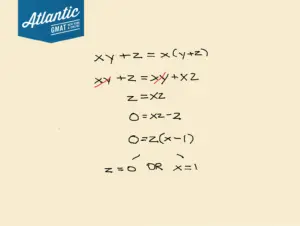If xy + z = x(y + z), which of the following must be true? GMAT Explanation + Additional Examples!
If xy + z = x(y + z), which of the following must be true?
- x = 0 and y = 0
- x = 1 and y = 1
- y = 1 and z = 0
- x = 1 or y = 0
- x = 1 or z = 0
Define the question:
There are two things that are important to note.
- Which of the following must be true? The keyword here is “must.” The question is not asking which of these can be true – so we aren’t just plugging in answer choices and seeing if the equation works out. We need to do some work to deduce what must be true about the equation.
- The answer choices have slight differences. A, B, and C are all “and” statements, while D and E are “or” statements.
So, for answers A, B, or C to be correct, we’ll need both variables to have their specified value, and for D and E, either variable having its specified value on its own will suffice.
Algebra time:
Let’s dig into: xy + z = x(y + z).
Our first step is to simplify by distributing out the ‘x’ on the right-side.
xy + z = xy + xz.
We now have an ‘xy’ term on either side. This works out quite nicely, as we can subtract xy from both sides, making the equation much simpler:
z = xz.
Let’s get everything to one side and factor:
0 = xz – z
0 = z(x – 1)
From here, we can see that this equation is satisfied by either z = 0 or x = 1.
Answer: E
Here is all of that worked out:
Alternate Solution:
Going back a couple steps, let’s think more about what subtracting ‘xy’ from both sides actually means. When we end up at the simplified equation:
z = xz
There’s no ‘y’ to be found anywhere.
Since we were able to subtract out ‘y’ from the equation, we are essentially saying that the value of y does not matter. In other words: y could be anything.
The question specified that the values of the variables must be true.
As the value of y could be anything, we can effectively rule out any answer choice that specifies a value for y.
That rules out everything but E.
Answer: E

